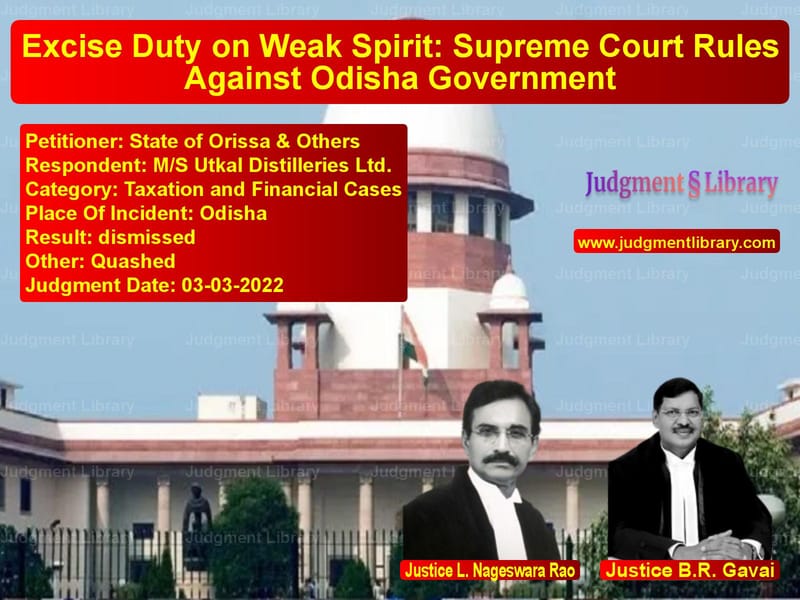Excise Duty on Weak Spirit: Supreme Court Rules Against Odisha Government
The case of State of Orissa & Others vs. M/S Utkal Distilleries Ltd. revolves around a dispute concerning the levy of excise duty on weak spirit generated during the manufacturing of Indian Made Foreign Liquor (IMFL). The Supreme Court ruled in favor of the respondent distillery, striking down the Odisha government’s demand notices imposing excise duty on weak spirit.
This ruling reinforces the principle that states cannot impose excise duty on alcohol that is not fit for human consumption.
Background of the Case
The dispute originated when the Commissioner of Excise, Odisha, granted a license to Utkal Distilleries Ltd. on September 12, 1990 for the manufacturing, blending, bottling, and reduction of IMFL. The license required the company to install a rectification column to purify rectified spirit before it was used to manufacture IMFL.
During the rectification process, weak spirit was generated as a byproduct. Since the excise rules of Odisha did not specify how such weak spirit should be treated, Utkal Distilleries approached the Commissioner of Excise, seeking guidance on the matter.
In response, the government formed a Technical Committee on November 21, 1992 to examine the issue. The committee found that:
- Several states permitted some degree of process loss during rectification.
- Maharashtra allowed 2% wastage, Bihar 1.5%, Andhra Pradesh 2%, and Karnataka 3%.
- Odisha should adopt a 2% wastage allowance.
The Odisha government accepted the committee’s recommendation and formally allowed a 2% process loss. However, it later issued demand notices to Utkal Distilleries, imposing excise duty on weak spirit exceeding the 2% threshold.
Utkal Distilleries challenged the demand notices before the Orissa High Court, which ruled in its favor. The state government appealed the decision before the Supreme Court.
Arguments of the Petitioner (State of Odisha)
The Odisha government, represented by Senior Counsel M.N. Rao, argued:
- The company had initially agreed to the 2% wastage allowance and could not now contest it.
- Any weak spirit beyond the 2% limit was taxable as per excise laws.
- Excise duty was applicable on all spirit, whether potable or not, under the Odisha Excise Act.
Arguments of the Respondent (Utkal Distilleries Ltd.)
The distillery, represented by Advocate Soumyajit Pani, countered:
- Weak spirit was an impure byproduct and not fit for human consumption.
- The Supreme Court had previously ruled that states cannot impose excise duty on non-potable alcohol.
- A chemical examination report confirmed that the weak spirit was unfit and unsafe for drinking.
- The government’s demand notices violated the principle established in Synthetics and Chemicals Ltd. vs. State of U.P., which restricted state excise duties to alcoholic liquor for human consumption.
Supreme Court’s Observations
The Supreme Court, comprising Justices L. Nageswara Rao and B.R. Gavai, analyzed previous case law and statutory provisions. The Court made the following key observations:
- The Constitution differentiates between alcohol for human consumption (taxable by states) and industrial alcohol (taxable by the central government).
- The Constitution Bench ruling in Synthetics and Chemicals Ltd. explicitly held that states cannot impose excise duty on industrial alcohol.
- The weak spirit in question was chemically tested and found unfit for drinking.
- Section 27 of the Bihar and Odisha Excise Act, 1915, defines excisable articles as alcoholic liquors meant for human consumption, which weak spirit does not qualify as.
- The State of Odisha lacked legislative competence to levy duty on non-potable alcohol.
The Court emphasized:
“The Constitution Bench has held that the State Legislature had no authority to levy duty or tax on alcohol, which is not for human consumption as that could only be levied by the Centre.”
Supreme Court’s Verdict
On March 3, 2022, the Supreme Court ruled:
- The Odisha High Court’s judgment was upheld.
- The demand notices issued by the state government were quashed.
- The Odisha government was directed to refrain from imposing excise duty on weak spirit in the future.
The Court concluded:
“The appeals are found to be without merit and are dismissed.”
Conclusion
The Supreme Court’s ruling establishes several key legal principles:
- Excise duty cannot be imposed on non-potable alcohol. The Constitution differentiates between alcohol for human consumption and industrial alcohol.
- States lack jurisdiction to tax industrial alcohol. The power to tax non-potable alcohol lies with the central government.
- Scientific tests matter in excise disputes. Chemical reports confirming that a substance is unfit for human consumption are critical in determining excise liability.
This landmark ruling prevents states from imposing excise duty on industrial byproducts, ensuring fair taxation practices in the liquor industry.
Petitioner Name: State of Orissa & Others.Respondent Name: M/S Utkal Distilleries Ltd..Judgment By: Justice L. Nageswara Rao, Justice B.R. Gavai.Place Of Incident: Odisha.Judgment Date: 03-03-2022.
Don’t miss out on the full details! Download the complete judgment in PDF format below and gain valuable insights instantly!
Download Judgment: state-of-orissa-&-ot-vs-ms-utkal-distilleri-supreme-court-of-india-judgment-dated-03-03-2022.pdf
Directly Download Judgment: Directly download this Judgment
See all petitions in Tax Evasion Cases
See all petitions in Customs and Excise
See all petitions in Banking Regulations
See all petitions in Judgment by L. Nageswara Rao
See all petitions in Judgment by B R Gavai
See all petitions in dismissed
See all petitions in Quashed
See all petitions in supreme court of India judgments March 2022
See all petitions in 2022 judgments
See all posts in Taxation and Financial Cases Category
See all allowed petitions in Taxation and Financial Cases Category
See all Dismissed petitions in Taxation and Financial Cases Category
See all partially allowed petitions in Taxation and Financial Cases Category







